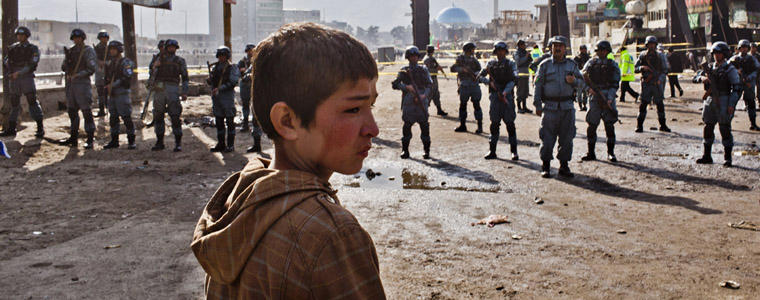In Afghanistan, Creating Effective Advisers for Times of Crisis
USIP's Nadia Gerspacher explains the value of programs that help build the Afghan ministries in the wake of troubling reports from Afghanistan.

As dramatic events unfold in Kabul, especially within the Afghan ministries, I am reminded of how much of an impact good mentoring and training can have on the ability of advisers within the ministries to do their jobs, even when they confront extraordinary circumstances like they do now. Last weekend, two American officers were shot dead inside the Ministry of Interior, allegedly by another employee of the Ministry after protests began over the burning of copies of the Koran by American military personnel. Yesterday, two more Americans were shot by two Afghans, one reportedly posing as a member of the Afghan military.
No amount of advising can necessarily prevent this kind of violence. But USIP knows something about the kind of training it takes to help advisers working within a ministry to cope with such horrific incidents and how to mitigate their impact on the Afghan-U.S. relationship and strategy.
In its course for advisers and mentors, USIP teaches professionals who want to deploy as advisers how to develop a working relationship with their foreign counterpart that will withstand problems like the ones we are seeing now. One of the things USIP’s course teaches them is how important it is for advisers to develop a working relationship with their foreign counterparts that is based on mutual respect between peers. Both have contributions to make to a specific reform activity but outside advisers must learn to work in and have a positive contribution to a bureaucracy they will at least initially find works much differently than their own.
Indeed, the adviser lacks a cultural compass and needs guidance on which ideas represent viable and sustainable solutions that can be implemented and owned by the local officials and their institutions – and which ones can’t. Such solutions simply cannot be seen as being forced on them from the western world – nor should they be. But during events such as the current ones taking place in Afghanistan, the adviser may be seen as being guilty by association and the work that he or she has done with their counterparts may be wasted. Or worse, the relationship could become broken altogether and a lot of time, energy and sacrifice wasted.
USIP has taught advisers and mentors, including several that are currently serving in Afghanistan in what’s called the Ministry of Defense Advisers (MoDA) program. The Institute has conducted training and other provincial capacity building missions that highlight how to build a relationship with a counterpart that really does attempt to inculcate in the advisers the need to understand the Afghan culture and Afghans' approach to problem-solving. The Institute is currently looking at lessons learned that show how advisers who build strong, independent relationships are able to continue the work they have been doing with their foreign colleagues.
The current situation shows how a positive relationship between adviser and counterpart requires strong communication skills. That should mean that the local adviser would feel comfortable enough to talk with his or her counterpart, and see that adviser as a resource for solutions. In logistics management reform, for example, the joint development of an inventory system for Army and police equipment is based on open communication and a common identification of problems so the ministry can address the issue. The key is getting to the point where a local ministry official is willing to divulge that there are problems within his government and be willing to talk about how to fix them. It takes a secure bond between the two that arises out of sharing professional, tangible ideas and implementing them together. That’s what good adviser training is all about.



